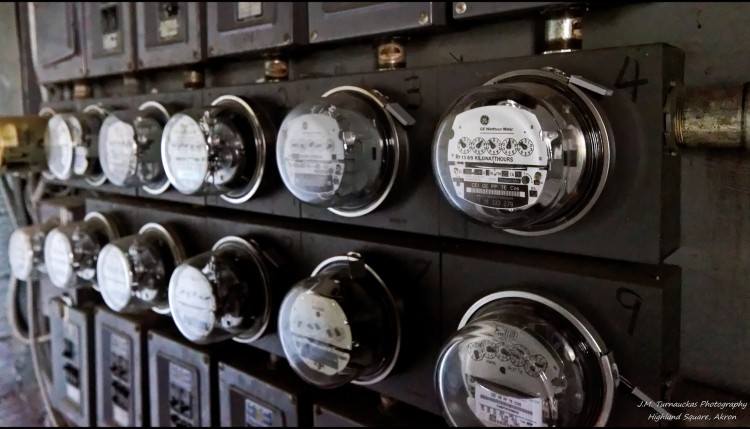Here's a little secret about government programs: There are TONS of them -- especially in a progressive state like Massachusetts -- and unless you're some kind of mega-wealthy plutocrat (in…

6 household services you can switch to save money
Disclosure: This post is sponsored by Choose Energy, an online marketplace where consumers can compare rates from electricity and natural gas suppliers. I’m a member of their compensated blogger program; however, all opinions expressed here are my own.
When you move into a new house, it’s a whirlwind getting everything set up. You have to wait for the cable guy and/or Internet guy, who will be there sometime between noon and next January. You have to call the gas company, and then the electric company, and tell them each to put the bill in your name and to stop the service at your last address. (And, if you’re like me, pay them $13 you’ve apparently owed them since 2005.)
When it’s all finally set up, the last thing you want to do is change any of it — and that’s where they get you. Sure, you might get outraged once in a while at your high cable or electric bill, but you probably feel resigned to keep paying it anyway.
We tend to assume these monthly bills are forever fixed — and to be sure, some of them are, like your water and sewer service. But many more of them can be changed. All it takes is a little legwork to shop around, which can be well worth the effort.
Here are six household services you can switch to save yourself money.
1. Cable TV
Ok, this isn’t true for everyone, but hear me out. In most cities around Boston, you have just one option when it comes to cable. (That’s why you can’t get Verizon FiOS in bigger Massachusetts cities.) While this obviously reeks of monopoly to you and me, the cable companies get around that little legality by bidding on the contract every few years. So, there is some competition for your business, at the town hall level, every five years or so.
I’m sure that’s very comforting as you plunk down an average of $99 every month for SportsCenter and re-runs of House Hunters International. But while you may not be able to switch cable providers, you can switch your TV service and save big money each month.
One option is to switch to DirecTV, but I don’t recommend it. We pulled this stunt in a fit of Comcast-inspired rage a few years ago, and it was great for a year. For the first 12 months we had more channels for just $25/month or something crazy. Except….
They make you sign a two-year contract, with a HEFTY cancellation fee, and because the pricing structure is so convoluted and entwined with Verizon DSL, it was literally impossible to find out how much more we’d pay for the second year of our service. Until, that is, Month 13, when we learned the answer: A LOT! Our bill more than tripled, to like $80/month. It was so bad I ended up paying hundreds of dollars to get out of the contract and crawled back to Comcast groveling with my tail between my legs.
Not that we paid Comcast for cable TV, though. No, we’ve cut that cord. We pay them for Internet, which ain’t cheap — like $60 a month — and use a digital antenna to get the major networks (NBC, ABC, CBS, FOX, PBS, and a bunch of smaller ones) broadcast in HDTV for free, including nonstop, commercial-free kids programming on WGBH Kids. For everything else, we stream it using Netflix, Amazon Prime, or Hulu.
Because of a quirk in Comcast’s price structure, we actually do pay $8/month for super-basic cable — it’s network TV, not even in high definition; but we literally just leave the cable unused and coiled up behind the couch. Why? Because as an existing TV customer, you get $15 off Internet service. It’s moronic, but hey it saves us seven bucks. What’s more, that means we’re technically Xfinity customers and are allowed to stream new episodes of network shows on Hulu and Xfinity.com for free.
The only thing we miss are some live sports — obviously most football and big local games are broadcast live on over-the-air networks. But until this past year, you couldn’t get ESPN without a cable subscription.
Well, now you can: For $20 a month, SlingTV allows you to stream live programming from a number of the most popular, traditionally cable-bound TV channels, like ESPN, Food Network, A&E, CNN, History Channel, TBS, TNT, HGTV, Disney Channel, and more.
Combine that with an $8 Netflix subscription and digital bunny ears, and you’ve got an awesome array of high-def television options for $28 a month + Internet.
2. Internet
Speaking of the Interwebs, you can pay less for that, too. Comcast alone offers like four different tiers of Internet service, with varied download speeds. Of course the Mega-Big-Blast package or whatever sounds appealing, but there’s no sense paying more than you need to here. I work from home and we stream most of our TV programming, and we get buy just fine with the mid-range 25 MBps package. If you have three teenagers watching separate shows or gaming online all at the same time, maybe then it’s time to think about the 100 MBps tier, but not before.
And of course, cable Internet is not the only game in town. DSL — faster than old-school dial-up, but still served through the phone line — is available separately and typically for far cheaper rates.
When we made that ill-fated DirecTV switch, we used Verizon DSL for a year-plus, and it was fine. Videos could get sluggish once in a while, but it never stopped me from working, and it was only like $20 a month — one-third the price of even a mid-range Comcast plan.
Besides price, DSL has another nice benefit over cable, which is that you have what amounts to a direct line, whereas cable Internet users can be subject to data traffic jams during peak usage. In any event, it’s an option worth considering — saving $30 or more per month adds up fast.
Finally, you could consider ditching wired Internet altogether and tacking on a few more GB of data onto your smartphone plan. If you’re already paying $60 for 10GB of data or so, and not using a lot of it, why not try adding a device like a Wi-Fi hotspot and a few more GB to your plan? If it doesn’t work out, that’s fine – Comcast will always take you back, I can assure you from experience.
This may not work if you routinely stream movies or work from home full-time. But a lot of people don’t suck up nearly as much data as they think they do. There’s a good chance you could meet your online needs with just $20 or so more wireless data each month.
3. Electricity
If you feel like your electric bill is too high, there are plenty of ways to lower it just by saving energy. But in Massachusetts and about a dozen other states, you can also change who supplies your electricity through an online marketplace like Choose Energy.
You’ll still receive electric service through your town’s distributor — be it National Grid, Eversource, or someone else; that part you can’t change. But you can change where that energy comes from, and how much you’re paying for it.
A site like Choose Energy allows consumers to compare electricity rates from various vetted suppliers. The average household can often save $10 to $20 a month simply by switching to a lower-cost supplier. Just be careful to read the terms of the pricing — some suppliers offer their lowest rates on variable plans that can change after a few months.
“Variable rate plans can be brutal,” says Kerry Cooper, CEO of Choose Energy. “We would recommend every consumer go with a fixed-rate plan.” You can lock in a rate for a year or more to avoid any surprises.
After you compare the options in your ZIP code and decide on a new supplier, Choose Energy will contact your electric company and take care of the switch, which can go into effect in as few as 15 days at your next meter reading.
The best part? You don’t even have to talk to anyone on the phone, much less wait around for a service tech to arrive sometime between 10am and 3pm. All that changes is the rate you’ll pay in the “supply” portion of your next electric bill. If only switching cell phone plans was so easy.
4. Cell phone
Well, it’s easier than it used to be at least. You can keep your phone number now, of course, unlike the early days. And with the competitive cell phone wars in full force, most carriers will pay your early termination fees to recruit you to their service.
Start by seeing if any of the big carriers (Verizon, AT&T, T-Mobile, or Sprint) offers a better plan for your needs at a lower price than what you’re paying. That might save you $10-$40 a month if you can bundle a family plan or knock off an unnecessary paid GB or three of data.
But if you’re really serious about saving money, look into upstarts and smaller carriers such as Ting, Cricket, and Virgin Mobile. They can save you buckets of money if they work in the places you need them to — namely, your home and your office.
Check with coworkers and nearby neighbors, either in person or on a localized app like NextDoor, to see if anyone is using a cheaper carrier and what the service is like in the area. You need good reception at home and at work.
Like most younger families, we don’t have a landline (and haven’t since, jeesh, 2004?), so we rely on our cell phones; we absolutely need good reception in our house. But other than that? I’m not making calls from the Rocky Mountains or off the coast of Maine; I just need my phone to work at home and in other major metro areas, which most carriers — if they get the home part right — can accommodate, often for a lot less money than Verizon or AT&T.
I’m also going to add this hot tip: If you’re still using an older smartphone, and you’re no longer confined to a contract, Verizon will discount you $15-$25 a month every month you keep using the old smartphone. Essentially this is because your old two-year contract had the price of the phone subsidy lumped into it — by now, that subsidy is long paid off and frankly they’d be stealing from you if they kept charging you for it! But, of course, you have to call and ask them to do this — it’s not something they’re in a hurry to fix for you.
5. Trash pickup
A number of more rural or suburban towns on the outskirts of metro Boston — including Bridgewater, Needham, Wellesley, Pembroke, and Millis — don’t offer curbside trash pickup; residents have to make their own arrangements, usually opting for weekly pickup from one of a couple competing businesses.
As a resident of Quincy, where the city’s garbage guys would haul away a dead elephant if you left one on the curb, this astounds me. Garbage pickup is something we tend to take for granted. But as with anything else, where there is competition, there is a chance to save money, and it’s well worth your time to investigate your options. Most towns will have at least two companies competing for your business, so ask neighbors which one they use and get quotes from both.
And then there’s the cheapest route: Take your garbage to the dump yourself, and only pay for what you toss. While this is probably the smelliest option among them, it can encourage people to recycle more and start composting, since they’re paying per bag – and that’s a plus.
6. Heating oil and maintenance
Oh, oil. So maddeningly expensive when we had oil heat, so cheap now that we’ve converted to gas! But I still don’t miss it, not one bit.
Yet there is one nice thing about having oil heat as opposed to gas: You can switch oil companies.
Most oil suppliers will offer new customers a discounted rate for their first full season — say, a 10-cent-per-gallon discount or a free year of furnace/boiler maintenance. If you get a good company, they’re worth sticking with, even once the discount disappears: They know your house, where the oil tank is, and the condition of your heating equipment. That’s very valuable information when it’s 12 degrees outside and the boiler’s busted.
However, there’s nothing to stop you from bouncing around between suppliers to take advantage of new-customer discounts, or simply comparing quotes and service plans. About a third of Massachusetts homes still use oil heat, compared to just 6% nationwide, so there are tons of companies around here to choose from. This site is helpful for gauging the going rate of oil in your area of New England. The bigger companies are usually able to offer more flexibility in terms of price-capped plans and other arrangements.
Yearly fees for a boiler or furnace tune-up and emergency maintenance can vary as well, in the neighborhood of $150-$300; if you have newer heating equipment, you may not need to pay for this service, but if your boiler or furnace is 10 years old or more, it’s well worth the investment.



